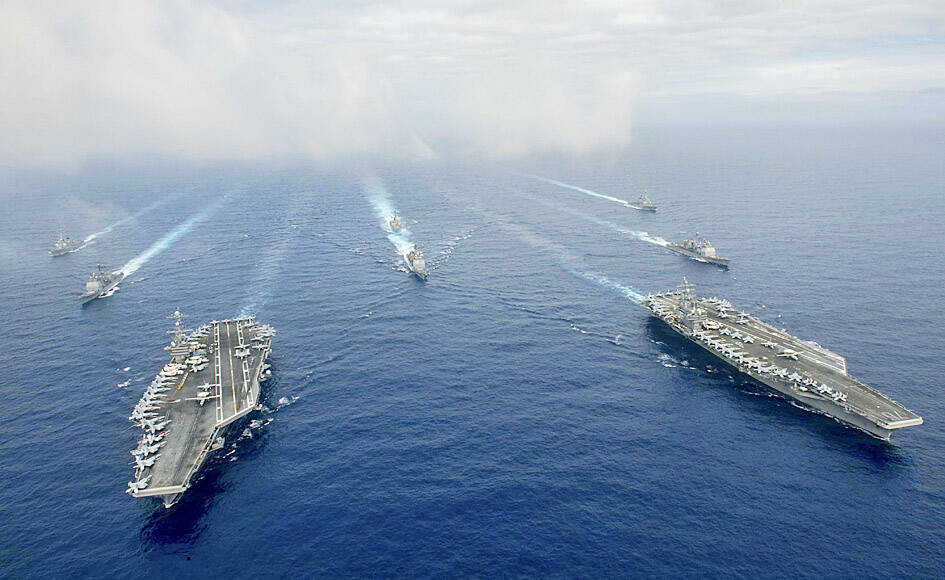The US and its allies could break a Chinese blockade of Taiwan, US Pacific Fleet Commander Admiral Samuel Paparo said.
The Chinese People’s Liberation Army Navy has “the number of vessels and the capability at sea to execute a blockade,” he told a news conference marking US Secretary of Defense Lloyd Austin’s visit to Hawaii on Saturday, Nikkei Asia reported.
“The question that follows is: ‘Do the allies have the capability to break that blockade?’ And the answer to that is a resounding yes,” he said.

Photo: Reuters
The US military alone could defeat a Chinese blockade with its volume of firepower and “superiority in key domains,” he said, likely referring to nuclear submarines and other undersea forces.
However, an unnamed US official told Nikkei that Beijing could use means other than naval forces to effectively blockade Taiwan.
Citing Beijing’s military exercises in August, the official said China fired 11 ballistic missiles into designated exercise areas in the waters off the ports of Taipei and Kaohsiung, causing disruptions to maritime and air traffic.
“That’s a pretty significant impact on normal activities,” the official said, underscoring the missile threat to Taiwan’s aerial and marine lines of communication.
“You could essentially blockade Taiwan’s access, through the repeated imposition of these kinds of closure areas, legally, safely and in a way that would be extraordinarily difficult, either for Taiwan or the US, to challenge and to counter,” they said.
A senior Taiwanese official was cited by Nikkei as saying that the nation would not bow to Beijing’s pressure.
“The Chinese pressure campaign, coercion campaign, has proven to be counterproductive,” said the official, who spoke on condition of anonymity.
“These coercive measures not only strengthen our people’s determination, our will, to defend our own democracy, but also rally international support to Taiwan,” they said.

CHAOS: Iranians took to the streets playing celebratory music after reports of Khamenei’s death on Saturday, while mourners also gathered in Tehran yesterday Iranian Supreme Leader Ayatollah Ali Khamenei was killed in a major attack on Iran launched by Israel and the US, throwing the future of the Islamic republic into doubt and raising the risk of regional instability. Iranian state television and the state-run IRNA news agency announced the 86-year-old’s death early yesterday. US President Donald Trump said it gave Iranians their “greatest chance” to “take back” their country. The announcements came after a joint US and Israeli aerial bombardment that targeted Iranian military and governmental sites. Trump said the “heavy and pinpoint bombing” would continue through the week or as long

TRUST: The KMT said it respected the US’ timing and considerations, and hoped it would continue to honor its commitments to helping Taiwan bolster its defenses and deterrence US President Donald Trump is delaying a multibillion-dollar arms sale to Taiwan to ensure his visit to Beijing is successful, a New York Times report said. The weapons sales package has stalled in the US Department of State, the report said, citing US officials it did not identify. The White House has told agencies not to push forward ahead of Trump’s meeting with Chinese President Xi Jinping (習近平), it said. The two last month held a phone call to discuss trade and geopolitical flashpoints ahead of the summit. Xi raised the Taiwan issue and urged the US to handle arms sales to

State-run CPC Corp, Taiwan (CPC, 台灣中油) yesterday said that it had confirmed on Saturday night with its liquefied natural gas (LNG) and crude oil suppliers that shipments are proceeding as scheduled and that domestic supplies remain unaffected. The CPC yesterday announced the gasoline and diesel prices will rise by NT$0.2 and NT$0.4 per liter, respectively, starting Monday, citing Middle East tensions and blizzards in the eastern United States. CPC also iterated it has been reducing the proportion of crude oil imports from the Middle East and diversifying its supply sources in the past few years in response to geopolitical risks, expanding

Pro-democracy media tycoon Jimmy Lai’s (黎智英) fraud conviction and prison sentence were yesterday overturned by a Hong Kong court, in a surprise legal decision that comes soon after Lai was jailed for 20 years on a separate national security charge. Judges Jeremy Poon (潘兆初), Anthea Pang (彭寶琴) and Derek Pang (彭偉昌) said in the judgement that they allowed the appeal from Lai, and another defendant in the case, to proceed, as a lower court judge had “erred.” “The Court of Appeal gave them leave to appeal against their conviction, allowed their appeals, quashed the convictions and set aside the sentences,” the judges